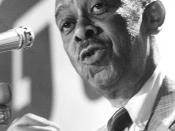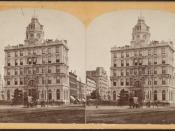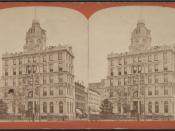African-American Psychologist Mamie Phipps Clark Mamie Katherine Phipps was born in 1917 in Hot Springs, Arkansas. She was the eldest of the two children of Harold and Katie F. Phipps. She attended elementary, secondary, and high school in the racially segregated town. After graduating at age sixteen, Phipps attended Howard University, with a major in mathematics and physics.
At Howard, Phipps was an academic scholarship awardee and worked part-time in the psychology department. Around this time, she met her future husband, Kenneth Clark, and through his suggestion, changed her major to psychology. She excelled in psychology and graduated Magna Cum Laude in 1938.
In the fall of 1938, she began graduate school at Howard and her interest in developmental psychology began to escalate. Phipps married Clark and with his help, was able to talk to Ruth and Gene Horowitz doing research studies with children. This research, which later became her master thesis was called, "The Development of the Consciousness of Self in Negro Pre-School Children."�
This paved the way for an increase in psychological research into the areas of self esteem and self-concept.
After completing Howard's graduate program, she enrolled in Columbia University to study for her Ph.D. degree. She was the only African-American graduate student at Columbia, but didn't see it as a problem. Clark was eager to learn and felt that her time at Columbia was a very satisfying experience. Following her graduation, she felt the impact of being black and a woman in New York in the mid-1940s. Job offerings were few, however she did manage to get a job analyzing research data, which she later described as being "humiliating and distasteful,"� however she preserved and gleaned knowledge from the experience. In 1946 she worked for the Unites States Armed Forces Institute as a research psychologist, and was later offered a job at the Riverdale Home for Children in New York as a psychologist. There, she gave psychological test and counseled homeless black girls. This experience provided her with clear perceptions of the insufficiencies of psychological services for blacks and other minority children in New York City and laid the foundation for her life's work and significant contributions in the field of developmental psychology (p.70).
Clark was a strong believer in basic research, but at the same time felt that applied psychology would benefit the children more. As a result, she and her husband established the Northside Center for Child Development in Harlem. It provided pediatricians, psychologist, psychiatrist, and social workers. During this time, the main issues were desegregation and negative self-image. Activist were trying to adopt the concept of "Black Pride,"� and the idea that "Black is Beautiful."� Parents motivated their children to assert themselves and pursue previously denied goals that they thought were unattainable because of their skin color. Mamie Clark made it clear the there were no differences between black and white children, which many whites, and some blacks, believed at the time.
Clark took on several responsibilities throughout her life time besides the ones mentioned previously. Some of them include being on the Board of Directors for the American Broadcasting Company, Mt. Sinai Medical Center, Union Dime Savings Bank, Museum of Modern Art, Teachers College of Colombia, Phelps Stokes Fund, New York Mission Society, and was the president of the Museum Collaborative. She also served with several advisory groups like Harlem Youth Opportunities Unlimited (HARYOU) and the National Headstart Planning Committee.
Mamie Phipps Clark died on August 11, 1983 and left behind her husband Kenneth Clark of 45 years (he was the 79th president of the APA), their daughter Kate, who is now the director of the Northside Center for Child Development, and a son, Hilton who is a NYC councilman.




